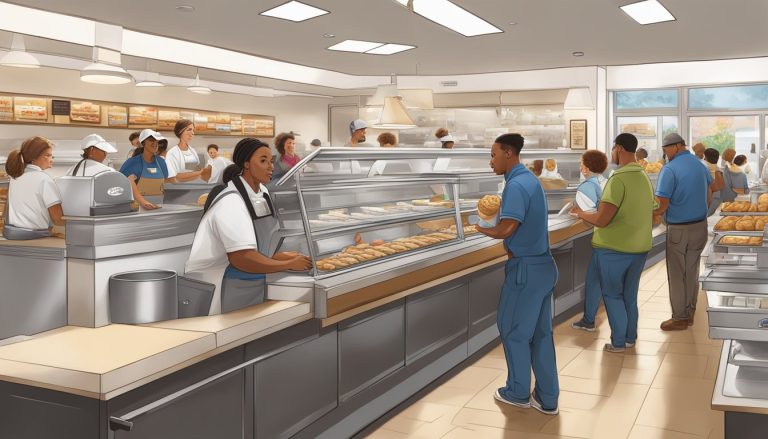Chick-fil-A’s breakfast offerings have become a significant contributor to local economies across the United States. The fast-food chain’s morning menu attracts a steady stream of customers, creating jobs and stimulating economic activity in communities where its restaurants are located.
Chick-fil-A’s breakfast service generates substantial revenue for franchisees and provides employment opportunities for local residents. The company’s expansion strategy, which includes careful site selection and a rigorous operator selection process, ensures that each new location has a positive impact on its surrounding area.
The introduction of Chick-fil-A to a town often sparks excitement among residents and local officials alike. This enthusiasm translates into increased foot traffic and sales, not only for the restaurant itself but also for neighboring businesses. As a result, Chick-fil-A’s breakfast service plays a vital role in fostering economic growth and community development in the areas it serves.
Chick-fil-A: An Overview

Chick-fil-A stands out as a major player in the fast food industry, known for its chicken sandwiches and distinctive business model. The company’s growth trajectory and unique approach have shaped its position in the market.
History and Expansion
Chick-fil-A began in 1946 when S. Truett Cathy opened his first restaurant, the Dwarf Grill, in Hapeville, Georgia. The signature chicken sandwich debuted in 1964, launching Chick-fil-A’s focused menu strategy. By 1967, Cathy started expanding through shopping mall locations.
The company’s growth accelerated in the 1980s and 1990s as standalone restaurants became more common. Chick-fil-A has experienced rapid expansion since 2000, more than tripling its restaurant footprint. In 2022 alone, the chain opened 174 new locations.
Chick-fil-A now operates over 2,600 restaurants across the United States and Canada. Its success stems from a commitment to quality food, exceptional customer service, and a unique franchise model.
Chick-fil-A’s Place in the Fast Food Industry
Chick-fil-A has carved out a distinct niche in the competitive fast food landscape. The chain’s limited menu, centered on chicken sandwiches, sets it apart from competitors offering broader selections.
The company’s franchise model differs significantly from industry norms. Chick-fil-A maintains strict control over real estate, restaurant design, and brand standards. Franchisees, called “Operators,” undergo rigorous selection and training processes.
Chick-fil-A’s organizational culture emphasizes core values and customer service. This focus has contributed to high customer satisfaction ratings and strong brand loyalty. The company has also implemented sustainability initiatives, such as converting used cooking oil into renewable diesel fuel.
Despite being closed on Sundays, Chick-fil-A has achieved remarkable sales figures, outperforming many competitors that operate seven days a week.
Economic Impact of Chick-fil-A Breakfast
Chick-fil-A’s breakfast offerings play a significant role in local economies through job creation and revenue generation. The morning menu drives customer traffic and sales, contributing to the company’s overall economic footprint in communities.
Contribution to Local Employment
Chick-fil-A’s breakfast service creates jobs in local communities. Each restaurant typically employs 15-20 staff members for the morning shift alone. These positions include cooks, cashiers, and customer service representatives. The breakfast rush often requires additional staff compared to other meal periods, boosting employment opportunities.
Many of these jobs go to young adults and students, providing valuable work experience. Chick-fil-A also offers competitive wages and benefits, further supporting local economies through increased consumer spending power.
The company’s expansion plans frequently include new breakfast locations, potentially creating hundreds of new jobs annually across various markets.
Market Potential and Revenue
Chick-fil-A’s breakfast menu contributes significantly to the company’s overall revenue. Industry estimates suggest breakfast sales account for 15-20% of Chick-fil-A’s annual revenue. In 2024, this could translate to over $2 billion in breakfast-related sales across all locations.
The breakfast market remains a growth opportunity for Chick-fil-A. As more consumers opt for convenient morning meals, the company’s market share in this segment continues to expand. Chick-fil-A’s breakfast offerings compete directly with other fast-food chains and local cafes, stimulating market competition and innovation.
Local franchises benefit from the breakfast revenue stream, reinvesting profits into their communities through taxes, local partnerships, and charitable giving.
Chick-fil-A’s Breakfast Menu
Chick-fil-A offers a diverse breakfast menu featuring both classic favorites and healthier options. The chain’s morning offerings blend their signature chicken with traditional breakfast fare, complemented by a range of beverages to suit various tastes.
Signature Breakfast Items
Chick-fil-A’s breakfast menu is anchored by its popular Chicken Biscuit, a hand-breaded chicken fillet served on a freshly baked buttermilk biscuit. Another fan favorite is the Chick-n-Minis, featuring bite-sized chicken nuggets nestled in warm, mini yeast rolls brushed with honey butter spread.
For those seeking a heartier meal, the Breakfast Burrito combines scrambled eggs, chicken, and cheese. Hash Browns round out the savory offerings, providing a crispy side to any breakfast selection.
The menu typically includes 15 to 19 items, depending on location. Prices may vary slightly between branches, reflecting the quality of fresh ingredients used.
Healthy Options and Specialty Beverages
Health-conscious diners can opt for the Greek Yogurt Parfait or the Egg White Grill, which features grilled chicken and egg whites on an English muffin. A Fruit Cup offers a lighter side option.
Chick-fil-A’s breakfast beverage selection includes coffee and specialty drinks. Their freshly-brewed coffee pairs well with any menu item.
The breakfast menu is generally available from 6:30 am to 10:30 am daily, providing customers with ample time to enjoy their morning favorites. This schedule may differ slightly by location.
Operational Aspects of Breakfast Service
Chick-fil-A’s breakfast service operates with precision and efficiency. The company’s focus on customer satisfaction and streamlined processes contributes to its operational success during morning hours.
Breakfast Hours and Customer Flow
Chick-fil-A typically serves breakfast from 6:30 AM to 10:30 AM. This four-hour window allows the restaurant to capture both early risers and late-morning customers.
The company strategically manages customer flow by offering a diverse menu that caters to various preferences. This includes classic items like chicken biscuits and newer options such as breakfast bowls.
During peak hours, Chick-fil-A employs additional staff to ensure quick service. The restaurant’s layout is designed to accommodate higher volumes of customers during breakfast rushes.
Efficiency and Drive-Thru Service
Chick-fil-A’s drive-thru service is a key component of its breakfast operations. The company utilizes a dual-lane system at many locations to reduce wait times and increase throughput.
Employees are trained to take orders accurately and efficiently. Mobile ordering options further streamline the process, allowing customers to place orders in advance.
The kitchen is equipped with specialized equipment to handle breakfast-specific items. This includes dedicated toasters for biscuits and griddles for eggs.
Chick-fil-A’s commitment to customer service extends to the drive-thru, with employees often braving weather conditions to take orders outside. This personal touch enhances the overall experience and contributes to customer loyalty.
Marketing and Promotions

Chick-fil-A’s breakfast marketing strategy combines digital innovation, targeted promotions, and value-driven pricing to attract customers and drive sales in local economies.
Advertising and Brand Presence on Social Media
Chick-fil-A leverages social media platforms to showcase its breakfast menu and engage with customers. The company’s Instagram and Facebook accounts feature appetizing photos of breakfast items, behind-the-scenes content, and user-generated posts. Twitter is used for quick updates and customer interactions.
Chick-fil-A’s mobile app plays a crucial role in breakfast marketing. It offers exclusive deals, rewards, and convenient mobile ordering options. The app’s personalized recommendations and push notifications help drive breakfast sales during slower morning hours.
Local franchises often run geotargeted social media ads to promote breakfast specials and new menu items. These campaigns are tailored to specific communities, highlighting nearby locations and emphasizing convenience for commuters and families.
Pricing and Value Propositions
Chick-fil-A’s breakfast pricing strategy balances competitive rates with perceived value. The company offers combo meals that bundle popular items at a slight discount, encouraging customers to try multiple breakfast options.
Menu engineering is used to highlight high-margin breakfast items alongside value-priced options. This approach caters to both budget-conscious consumers and those seeking premium offerings.
Seasonal promotions, such as limited-time breakfast items or discounts during slower periods, help maintain customer interest and drive traffic. The Chick-fil-A app frequently features breakfast-specific deals to incentivize mobile ordering and repeat visits.
Chick-fil-A emphasizes the quality and freshness of its breakfast ingredients in marketing materials. This focus on value proposition helps justify slightly higher prices compared to some competitors, positioning the brand as a premium fast-food breakfast option.
Customer Experience and Loyalty

Chick-fil-A’s breakfast offerings play a crucial role in creating positive customer experiences and fostering loyalty. The company’s commitment to exceptional service and quality food extends to their morning menu, contributing to repeat business and local economic growth.
Service Quality and Dining Experience
Chick-fil-A locations prioritize customer satisfaction during breakfast hours. Staff members are trained to provide prompt, friendly service even during the morning rush. The dining areas are kept clean and welcoming, creating a pleasant atmosphere for early risers.
Customers can expect consistent food quality across all Chick-fil-A locations. Breakfast items are prepared fresh to order, ensuring hot and tasty meals. The efficient drive-thru system caters to commuters seeking a quick breakfast on the go.
Menu boards are clearly displayed, making it easy for customers to choose their morning meals. Many locations offer mobile ordering options, reducing wait times and enhancing convenience for loyal customers.
Rewards and Customer Satisfaction
Chick-fil-A’s rewards program extends to breakfast purchases, incentivizing repeat visits. Customers earn points on morning meals, which can be redeemed for free menu items. This loyalty system encourages regular patronage and boosts local economic activity.
The company actively seeks customer feedback on their breakfast experience. Surveys and online reviews help Chick-fil-A locations identify areas for improvement and maintain high standards of service.
Special promotions, such as free coffee days or limited-time breakfast items, create excitement and draw in new customers. These initiatives often lead to increased foot traffic and sales for local franchises.
Chick-fil-A’s focus on customer satisfaction during breakfast hours contributes to building a loyal customer base. Positive experiences in the morning often translate to return visits throughout the day, benefiting both the company and local economies.
Competitive Landscape

Chick-fil-A faces stiff competition in the breakfast segment from established fast-food chains and emerging players. The company’s ability to innovate and differentiate its offerings plays a crucial role in maintaining its market position.
Competitors in the Breakfast Segment
McDonald’s leads the breakfast market with its extensive menu and global presence. Burger King and Wendy’s have also expanded their breakfast offerings in recent years. Starbucks competes in the coffee and breakfast sandwich category, while Dunkin’ targets similar customers with its breakfast items.
Regional chains like Bojangles and Whataburger present localized competition in certain markets. Fast-casual restaurants such as Panera Bread attract health-conscious consumers with their breakfast options.
Chick-fil-A’s unique selling points include:
- Fresh-made chicken biscuits
- Hand-breaded chicken
- Made-from-scratch biscuits
- Specialty coffee drinks
Innovation and Differentiation
Chick-fil-A continually updates its breakfast menu to stay competitive. Recent innovations include:
- Egg White Grill sandwich
- Greek Yogurt Parfait
- Hash Brown Scramble Bowl
The company focuses on quality ingredients and made-to-order preparation to set itself apart. Chick-fil-A’s customer service model, with friendly and efficient staff, provides a competitive edge in the fast-paced breakfast market.
Menu customization options and a mobile app for easy ordering cater to modern consumer preferences. Seasonal items and limited-time offers create buzz and drive customer interest in breakfast offerings.
Sustainable Practices and Community Engagement

Chick-fil-A demonstrates a commitment to sustainability and community involvement through various initiatives. The company focuses on reducing environmental impact while fostering strong local connections.
Environmental Initiatives and Product Sourcing
Chick-fil-A prioritizes sustainable practices in its operations. The company has implemented food waste reduction programs across its locations in the United States, Canada, and Puerto Rico. Through the Chick-fil-A Shared Table program, surplus food is donated to local organizations, providing millions of meals to those in need.
The restaurant chain also emphasizes responsible sourcing. They work with suppliers who adhere to strict environmental and ethical standards. This ensures that ingredients used in their breakfast menu and other offerings are produced sustainably.
Chick-fil-A actively seeks ways to minimize its environmental footprint. They have introduced eco-friendly packaging materials and energy-efficient equipment in many locations. These efforts appeal to environmentally conscious early risers who frequent the restaurant for breakfast.
Corporate Social Responsibility
Chick-fil-A’s corporate social responsibility extends beyond environmental concerns. The company invests in local communities through various programs and partnerships. One notable initiative is the Chick-fil-A Leader Academy, which focuses on youth development and leadership training.
Local Chick-fil-A franchise owners often engage in community service projects. They support schools, sponsor local events, and participate in charitable activities. This hands-on approach strengthens ties with the community and creates a positive impact beyond serving food.
The company also offers scholarship programs for employees. These educational opportunities help team members advance their careers, whether within Chick-fil-A or in other fields. This investment in staff development contributes to a skilled local workforce and economic growth.




